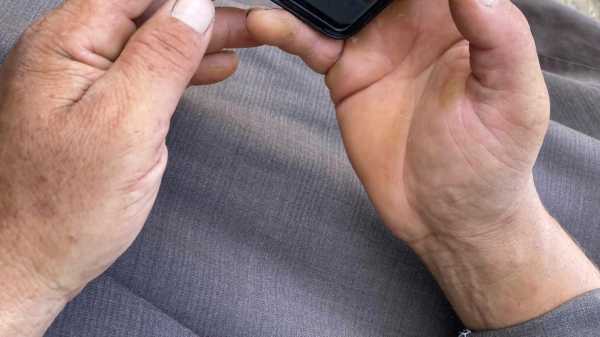
NAZLET EL-SHARIF, Egypt — The 42-year-old Egyptian farmer was watering his crops along the Nile River south of the capital of Cairo and scrolling on his mobile phone when he learned that two of his sons were dead.
Ashraf Sadawy Abdel-Fattah saw a list on social media with names of Egyptians killed in the horrific flooding that tore through the city of Derna in neighboring Libya on Sunday night.
His second-eldest son, Mohamed, 23, and Abdel-Rahman, who was 19, were on the list, along with six relatives and scores of other men from their village.
“It’s a great shock for the family, but also for the entire village,” Abdel-Fattah said, speaking to The Associated Press on Thursday outside his home in Nazlet el-Sharif, a village in the province of Beni Sueif.
At least 74 men from the village, some as young as 17, were killed when Mediterranean storm Daniel unleashed heavy rainfall on Derna on Sunday night. Two dams in the mountains above the city burst, sending a wall of water two stories high that wreaked destruction and swept entire neighborhoods out to sea.
The deluge proved deadly for thousands in just seconds, uprooting apartment buildings and washing away roads and bridges. More than 11,300 people were reported killed, according to the Libyan Red Crescent — including scores of Egyptians who had lived and worked in Derna for years.
Days later, searchers are digging through mud and hollowed-out buildings in Derna for 10,000 people missing and feared dead.
“It was like hell,” said Rashad Ezzat Abdel-Hamid, a 45-year-old Egyptian who survived the disaster. He said he and seven other Egyptians rushed to the roof of their three-story building when the wall of water surged through their street in the city center.
An untold number of people were washed away in the densely populated urban area, said Abdel-Hamid. When he came down after the surge subsided, it was a scene of horror.
Lifeless bodies, clothes, wrecked cars and furniture lay everywhere in the streets, inundated with mud and debris. Buildings had collapsed or were partially destroyed. Around him, people were wailing and crying, looking for their loved ones and trying to retrieve those under the rubble.
“Entire families drowned inside their homes. Others washed way to the sea,” said Abdel-Hamid, who returned to Egypt on Thursday. “Nothing was left but rubble.”
In comments to the Saudi-owned Al Arabia television station, Derna Mayor Abdel-Moneim al-Ghaithi said earlier this week the death toll could climb up to 20,000, given the number of neighborhoods hit by the wall of water.
Thousands of Egyptians were living in Derna, most of them working in construction projects in the city and the surrounding areas, said Abdel-Hamid. He had gone there only six months ago.
Egyptians have for decades gravitated to oil-rich Libya for work. In recent years, young Egyptians, like other Middle Eastern and African people fleeing conflicts and poverty, also used Libya as a transit point to try to reach Europe, across the Mediterranean Sea.
Libyan authorities say that so far, bodies of 145 Egyptians killed in Derna have been found. Dozens were buried in Libya, while 84 were taken to the nearby city of Tobruk and flown home, Egypt’s Foreign Ministry said.
In Nazlet el-Sharif, 167 kilometers (103 miles) from Cairo, 74 village men were buried in a mass funeral on Wednesday attended by local officials and hundreds of villagers.
The grief reverberates through the poor farming village, where cows and donkeys share dirt roads with cars, motorbikes and horse-drawn carts. Village homes face date palms groves and the fields are green with clover, corn and other grains.
“Some families lost one son, some two, and others lost three,” said Moustafa Aweis Moustafa, a retired civil servant. “These young men went there to help their families.”
Abdel-Fattah's Mohammed went to Libya three years ago to try to make their lives better, working as a day laborer in Derna, sending whatever money he could save to his father to keep the family going as Egypt sunk deeper into an economic crisis.
Earlier this year, Abdel-Rahman joined his brother in Derna after two years unsuccessfully looking for work in Egypt, their father said.
The last time spoke to them was on Sep. 8, a half-hour video call with the rest of the family. Mohamed talked to his mother about plans to marry and eagerly listened to news of how his new apartment was coming along. His father was building it for him, adding a third floor to the family home.
Abdel-Fattah's three nephews also died in Derna. Their mother, his sister-in-law, is in shock, unable to speak four days later, he said.
“The whole family has been ruined,” he said.
He finds little solace in the fact that he has been able to bury his sons — his heart goes out to other villagers, whose boys were buried hundreds of miles away in mass graves in Libya.
He keeps looking at the photos of his sons on his phone, and tears choke him up over and over again.
“They wanted us to live a better life,” he said of his two sons. “It’s a disaster, a disaster for the whole village.”
Sourse: abcnews.go.com






